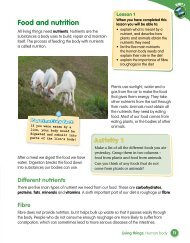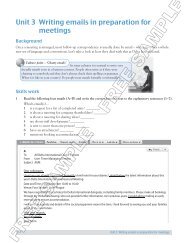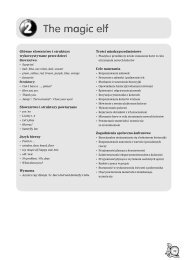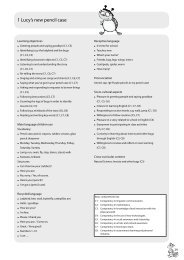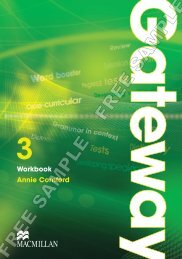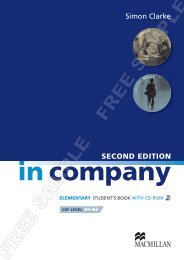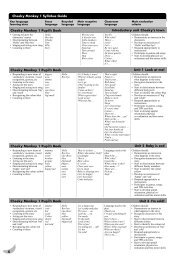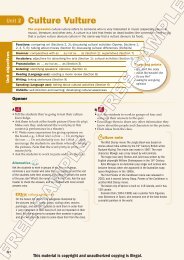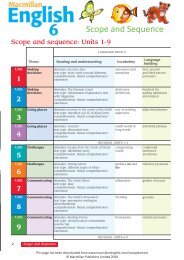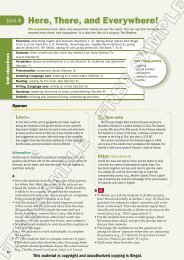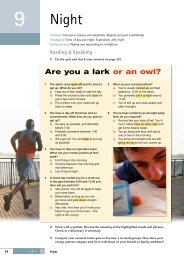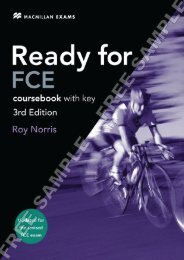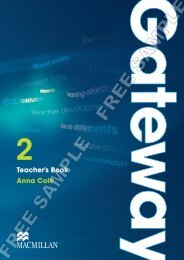9 In my life - Macmillan
9 In my life - Macmillan
9 In my life - Macmillan
Create successful ePaper yourself
Turn your PDF publications into a flip-book with our unique Google optimized e-Paper software.
11 My latest news<br />
Grammar<br />
• present perfect: just; present perfect and past<br />
simple<br />
Vocabulary<br />
• everyday activities; shopping<br />
LESSON 11a<br />
<strong>In</strong>troduction<br />
On the board write the following heading: MIELSA and three<br />
questions:<br />
Who do you usually write them to<br />
What do you usually write about<br />
What was the last one you wrote about<br />
Ask students to read the questions and guess what topic<br />
they refer to. Then they rearrange the letters in the heading<br />
to check their answer (answer: EMAILS) Divide students into<br />
groups of four and ask them to discuss the questions. Groups<br />
report the results of their discussion to the whole class.<br />
1 Guessing<br />
Focus students’ attention on the picture of Phoebe<br />
typing on her computer. Point to her thought bubble<br />
and explain that she is thinking about things that have<br />
happened to her and her family recently. Ask students<br />
to identify the people in the thought bubble: Phoebe’s<br />
mum, dad and her brother, Oscar. Point to the message in<br />
the bottom left-hand corner and elicit it is from Phoebe’s<br />
friend. Students should then try to guess Phoebe’s news<br />
on the basis of the pictures. <strong>In</strong> pairs, students compare<br />
their ideas.<br />
2 Presentation<br />
[1.40] Point to Phoebe’s computer and explain that she<br />
is writing an email to her cousin, Sandra, who lives in<br />
Australia. Elicit that she is writing about her news. Explain<br />
that we say: a piece of news when we want to count it<br />
as news is singular and uncountable in English. Students<br />
listen and read the email to count the pieces of news<br />
Phoebe tells her cousin and check their guesses from<br />
Activity 1. Play the CD.<br />
Elicit the answers. Refer students to Real English and<br />
demonstrate the meaning of the words and phrases by<br />
asking questions to different students, e.g. What do we<br />
say before we give exciting news Who are Harry Potter’s<br />
best pals What animals do you think are gorgeous<br />
Scratch the board with your fingernails to elicit Annoying!<br />
Point to the Text language section and elicit or explain<br />
in L1 that text language is a type of slang where words<br />
are abbreviated or simplified so that typing is faster<br />
and we need fewer characters. Make sure students<br />
understand it is used between young people in text<br />
messages or instant messages.<br />
Students read the instant message in the picture again.<br />
Ask them to explain what it says in their own words.<br />
Provide help if necessary. Find out if students use any<br />
abbreviations in their own text or instant messages.<br />
Optional Activity Book activities<br />
• Fast finishers p64, Extra practice p65<br />
Photocopiable activity:<br />
• What’s just happened p174<br />
Check if students know or can guess the meaning of the<br />
following words and phrases from the email: uniform,<br />
hairstyle, had kittens, birthday money, at a vet’s, get<br />
ready. Explain any words students still find difficult.<br />
Refer students to the Grammar spot to elicit or explain<br />
the use of the present perfect to report news. Explain that<br />
we often use just with the present perfect, which refers<br />
to a short time ago. When we use the present perfect, it<br />
means that we can still see the results of the event, e.g.<br />
I’ve changed <strong>my</strong> hairstyle – Phoebe’s hair is now different<br />
to what it looked like before. Refer students to the<br />
Grammar summary on page 101 for more information<br />
on the present perfect with just.<br />
Cultural information<br />
Text language is the English language slang used mainly in SMSs<br />
(Short Message Service, a form of text messaging on mobile<br />
phones) and IMs (<strong>In</strong>stant Messages, text-based communication<br />
between people over the <strong>In</strong>ternet). It cannot usually be found<br />
in standard dictionaries. To use the fewest number of characters<br />
and speed up typing common words are abbreviated, replaced<br />
by numbers, or their spelling is simplifi ed. You can introduce<br />
some common abbreviations your students may want to use in<br />
their own text or instant messages, e.g. plz=please, sry=sorry,<br />
thx=thanks, bf=boyfriend, gf=girlfriend, love=luv, np=no<br />
problem, cu l8r=see you later, 4=for, u=you.<br />
Tapescript<br />
see Student’s Book Activity 2<br />
Answer key<br />
1 Phoebe has just started her new school.<br />
2 She has changed her hairstyle.<br />
3 Her cat has just had three kittens.<br />
4 Oscar has just bought an MP3 player.<br />
5 Her mum and dad have been busy with DIY.<br />
6 They have just painted the kitchen.<br />
7 Her dad has hurt his back.<br />
8 Her mum has found a new job at a vet’s.<br />
9 Her pal Julie has just invited her for a sleepover.<br />
Extra activity<br />
Write the following exclamations on the board: Oops! Ouch!<br />
Wow! Sorry! Phew! How nice! Help! Elicit when we use<br />
them. <strong>In</strong> pairs, students make short dialogues orally, using the<br />
exclamations and the present perfect with just. Write a sample<br />
dialogue on the board:<br />
A: Oops!<br />
B: What’s happened<br />
A: I’ve just dropped <strong>my</strong> glasses.<br />
Set a time limit of eight minutes. Elicit one or two dialogues for<br />
each exclamation.<br />
T 34<br />
FREE SAMPLE FREE SAMPLE



